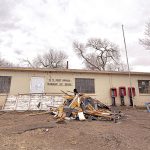
Concern grows, Delta variant infections rise
WINDOW ROCK
With states surrounding the Navajo Nation seeing a spike in COVID-19 cases, health professionals in the Navajo Nation continue to encourage vaccinations and mask wearing.
As the dominate strain in the U.S., the Delta variant has been driving case numbers up across the country and foiling any little hope there was to going back to a normal lifestyle.
It’s also impacting hospitals, especially in parts where vaccination numbers are low. There have been about 15 cases of the Delta variant on the Nation as of Tuesday.
“We continue to hear about this variant known as Delta,” said Cpt. Brian Johnson, acting deputy director for the Navajo Area Indian Health Service.
“Of course, that’s not the only variant out there,” he said. “But it is one that is of concern because we are seeing across the United States the positive new cases are predominately of the Delta variant.”
With other variants found on Navajo, including Delta, there have been about 188 cases –123 of the Alpha variant, four of the Gamma variant, 20 Epsilon variant, four Beta/Gama variant and 22 of the Delta/Epsilon variant.
“The Delta variant is very transmissible if you compare that to the original COVID-19 that we were dealing with,” Johnson said. “It can cause more severe disease, including more hospitalization and death.
“We continue to advocate and encourage people to get vaccinated,” he said. “With the increasing number related to the Delta variant, we know that the vaccines that are presently available are effective.”
Johnson emphasized that IHS facilities on Navajo do have plenty of vaccine doses. Regarding the increase in case numbers, Johnson said those stem from group gatherings. He said everyone must continue to stay vigilant by wearing masks and try not to be in large groups.
“We should all continue to wear our mask, whether we are on the Nation or going off the Nation,” Johnson said. “That is still a recommendation particularly now that we are seeing Delta in areas surrounding us.”
As of Tuesday, 28 new COVID-19 cases were reported for the Nation and no recent deaths. The total number of deaths remains 1,377.
The report indicates that 29,937 individuals have recovered from COVID-19 and 292,155 COVID-19 tests have been administered.
The total number of cases is 31,449, according to the Navajo Department of Health, in coordination with the Navajo Epidemiology Center and the Navajo Area IHS.
Also, the state of Arizona reported 1,974 new cases, Utah reported 728 and New Mexico reported 478.
The Navajo Health Command Operations Center issued a Health Advisory Notice for the following nine communities because of uncontrolled spread of COVID-19: Ganado, Indian Wells, Low Mountain, Pinon, Teesto, Houck, Kayenta, Manuelito, and Rock Springs. The cases reflect dates from July 16 to July 29.
“Our frontline warriors and contact tracers are doing the best they can to reduce the spread of the Delta variant, but they need our help,” said President Jonathan Nez.
Nez said with the Navajo Nation’s employee rate at 82% fully vaccinated, the tribe will more than likely move toward a vaccine mandate for tribal employees.
“Of course, there is going to be some exemptions,” Nez said. “But those who get exempt are going to require to get tested periodically. We want to encourage our Navajo Nation to get vaccinated.”
Dr. Amanda Burrage, from Tuba City Regional Health Care Corp, said she’s been hearing more and more of how people say they will get vaccinated if they get COVID-19, and she said it doesn’t work like this.
“If you already have COVID and are sick, vaccines do not help at that point,” Burrage said. “Your body needs time to have the immune system to ramp up and be able to protect you from the virus if you were exposed. If you had COVID in the past we still strongly recommend you to get vaccinated.”
Jill Jim, director for Navajo Department of Health, said figuring out a percentage of how many COVID-19 cases on Navajo are due to exposure to non-Navajos would be a near impossible thing to do, but what they do know is social gatherings are still a root cause of exposures and cases are increasing.
“We have an example of one person that went to a graduation dinner and it impacted nine households,” said Jim. “That is an example of how social gatherings are probably driving some of our numbers.”
Last week, she said the average seven-day cases were over a hundred, which is the first time in a long time.
But even with the increase in cases, it hasn’t impacted hospitalization in ICUs and the number of contact tracers wasn’t affected either.
“In the two surges we had we really needed volunteer medical providers and we had to request for federal assistance for medical staffing to make sure we don’t overwhelm our health-care system,” Jim said.
“If we didn’t receive the assistance from the federal government and some of these volunteer organizations, we probably would’ve been at a worse situation,” she said. “Our health-care system needs a lot of work, and we want to make sure everyone is doing their part.
“Wear your masks,” she said. “There’s no shame in wearing your masks.”
As a public service, the Navajo Times is making all coverage of the coronavirus pandemic fully available on its website. Please support the Times by subscribing.
How to protect yourself and others.
Why masks work. Which masks are best.
Resources for coronavirus assistance








 Highway 264,
Highway 264, I-40, WB @ Winslow
I-40, WB @ Winslow